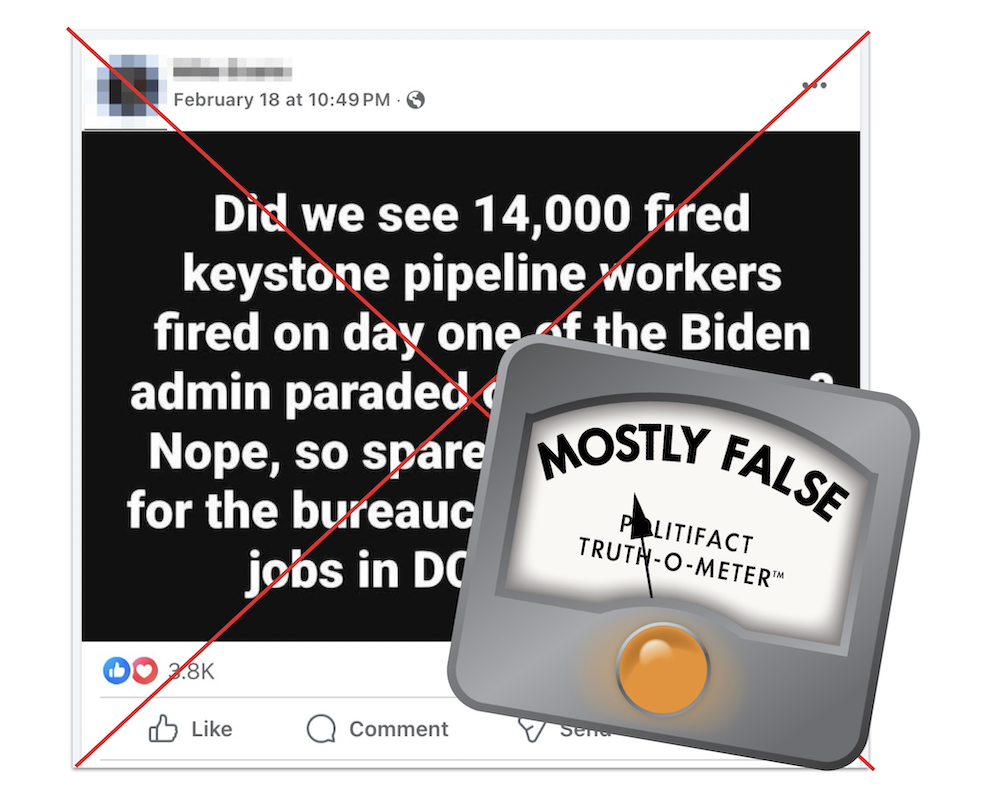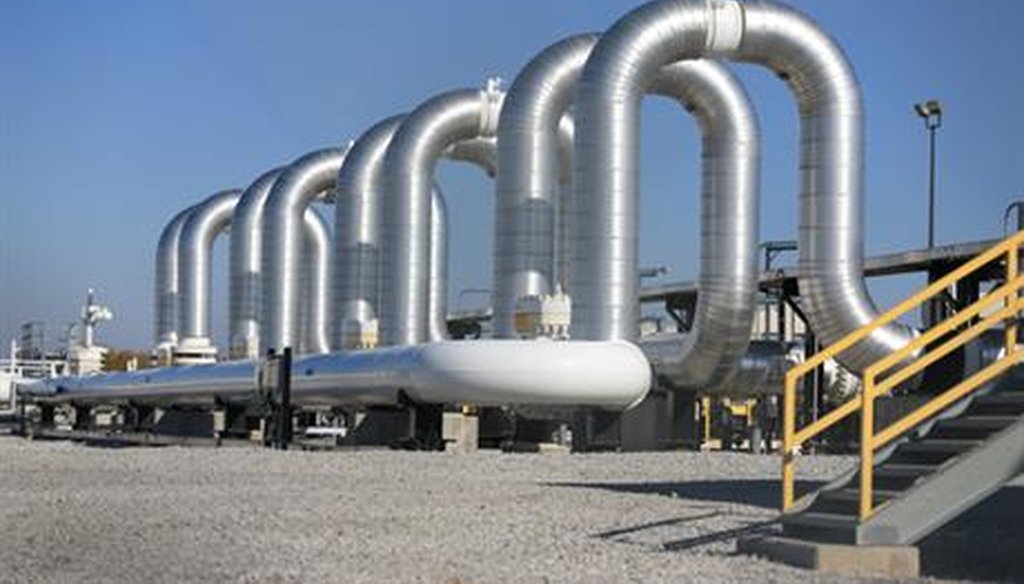



The Keystone Steele City pumping station in Nebraska in 2015. The Keystone XL pipeline is supposed to connect to the station. (AP)
On his first day in office in 2021, former President Joe Biden revoked a permit for the Keystone XL pipeline.
The next day, the company behind the project said it would eliminate about 1,000 jobs.
The pipeline would have created thousands of temporary construction jobs and would have required about 50 U.S. employees once operational, estimates said.
As President Donald Trump and his adviser Elon Musk take steps to drastically cut the federal workforce, some social media users supporting their efforts have deflected criticism by drawing a parallel to President Joe Biden revoking the Keystone XL pipeline permit.
"Did we see 14,000 fired keystone pipeline workers fired on day one of the Biden admin paraded on 60 minutes?" read an image shared by several people on Facebook. "Nope, so spare me your tears for the bureaucrats losing their jobs in DC right now."
These posts were flagged as part of Meta’s efforts to combat false news and misinformation on its News Feed. (Read more about our partnership with Meta, which owns Facebook, Instagram and Threads.)

(Screenshot from Facebook)
On Jan. 20, 2021, Biden revoked a permit for the Keystone XL oil and gas pipeline. The project would have extended the existing Keystone pipeline to run crude oil from Canada to Nebraska.
Construction was underway, with Reuters reporting that the pipeline was about 8% built, when Biden’s order halted its progress.
Some people lost their jobs.
One day after Biden revoked the permit, TC Energy — the company behind the project — "let go 1,000 workers in both the U.S. and Canada," WorldOil reported. Reuters reported that TC Energy told employees by email that it would "eliminate more than 1,000 construction jobs in coming weeks."
That’s the clearest number of job cuts we could find immediately following Biden’s decision — 13,000 fewer than the Facebook posts’ claims.
We didn’t find a CBS News "60 Minutes" segment specifically about the jobs cut after Biden revoked the Keystone XL pipeline permit (the Facebook post alludes to the show). But another CBS News show and other outlets, including Reuters, Verify and PolitiFact reported on the decision.
A 2014 State Department report found that spending on the Keystone XL pipeline project construction "would support approximately 42,100 jobs throughout the United States for the up to 2-year construction period."
That doesn’t mean the pipeline construction would have created more than 42,000 new jobs, however. The report specified that the term "support" encompassed newly created jobs and maintaining "existing jobs in current or new locations."
Pipeline spending would have supported 3,900 total "direct, temporary construction" jobs in states the pipeline ran through, the report said. And approximately 16,100 jobs would be "direct jobs at firms that are awarded contracts for goods and services," including construction.
The report said that 29% — or about 12,000 of the 42,100 jobs over two years — would have been in Montana, South Dakota, Nebraska and Kansas. It didn’t specify where other jobs would have been located.
The larger 42,100 total also included jobs supported by "indirect" and "induced" economic activity. Indirect economic activity refers to construction contractors’ purchases of goods and services, the report said. Induced economic activity occurs when construction workers and the people who provide goods and services to those workers spend what they’ve earned. The report listed money going to "ranchers providing beef" for construction workers as an example of induced economic activity.
The economic analysis firm The Perryman Group’s 2010 pipeline economic impact analysis for TransCanada (now TC Energy) estimated that the Keystone XL pipeline project would have created about 59,500 jobs each year of construction.
Two subsequent analyses — one in 2011 by Cornell University’s Global Labor Institute and another in 2012 by Regional Economic Models, Inc. — criticized the Perryman report.
Those analyses said the report overestimated the Keystone XL pipeline’s U.S. financial impact by including money spent outside the U.S. and reporting higher-than-average job wages.
The Regional Economic Models, Inc., report estimated about 16,000 to 36,000 Keystone XL pipeline construction jobs in the U.S. each year for two years.
The State Department’s 2014 report predicted that when the pipeline extension was completed and operational, it would require about 50 employees in the U.S., including 35 permanent employees and 15 temporary contractors.
"This small number would result in negligible impacts on population, housing, and public services in the proposed Project area," it said.
The 2011 Global Labor Institute report said that "based on the figures provided by TransCanada for the Canadian section of the pipeline," new permanent "pipeline jobs in the US number as few as 50."
Facebook posts said Biden "fired" 14,000 Keystone XL pipeline workers "on day one" of his administration.
On his first day in office, Biden revoked a permit for the Keystone XL pipeline’s construction. The next day, the company behind the project said it would eliminate about 1,000 jobs.
Various estimates said the project would create or support thousands of temporary jobs, and once completed, require about 50 U.S. employees.
There’s an element of truth — about 1,000 people lost their jobs — but we found no evidence that as many as 14,000 did.
We rate this claim Mostly False.
PolitiFact Researcher Caryn Baird contributed to this report.
RELATED: DOGE touts billions in canceled government contracts. Where are the numbers coming from?
RELATED: How does the US spend taxpayer money? What to know as DOGE, Elon Musk look for cuts
RELATED: End of Keystone pipeline did cost jobs, but most were temporary
Facebook post, Feb. 18, 2025
Facebook post, Feb. 18, 2025
PolitiFact, End of Keystone pipeline did cost jobs, but most were temporary, July 21, 2022
PolitiFact, How does the US spend taxpayer money? What to know as DOGE, Elon Musk look for cuts, Feb. 24, 2025
PolitiFact, DOGE touts billions in canceled government contracts. Where are the numbers coming from? Feb. 21, 2025
The New York Times, Where Trump, Musk and DOGE Have Cut Federal Workers So Far, Feb. 11, 2025
Associated Press, Firings, freezes and layoffs: A look at Trump’s moves against federal employees and programs, Jan. 28, 2025
CBS News, Trump, DOGE work to shutter CFPB, an agency created in response to the 2008 financial crisis, Feb. 23, 2025
CBS News, Firings and resignations at the Department of Justice in first weeks of the Trump administration, Feb. 23, 2025
PolitiFact, How Biden’s Keystone XL pipeline executive order affects American jobs, Jan. 21, 2021
USA Today, More than one way to slice a workforce: How Trump's cuts differ from Clinton's, Feb. 21, 2025
USA Today, Tracking federal layoffs 2025: Impacted agencies include IRS, FAA, TSA and more, Feb. 21, 2025
PolitiFact, Yes, Bill Clinton offered mass federal employee buyouts. Here’s why Trump’s program is different, Feb. 6, 2025
NPR, Biden Order Blocks Keystone XL Pipeline, Jan. 20, 2021
The White House, Initial Rescissions Of Harmful Executive Orders And Actions, Jan. 20, 2025
DW, Biden cancels Keystone XL pipeline project, Jan. 21, 2021
PolitiFact, Michels on target with claim his company was building Keystone Pipeline when Biden ended it, July 21, 2022
Michels, Michels Canada selected by TC Energy to construct Keystone XL Pipeline Project, June 23, 2020
The Washington Post, President Trump’s inflated estimate for Keystone XL construction jobs, Jan. 25, 2017
U.S. Department of State, Archived Keystone XL Pipeline, accessed Feb. 24, 2025
United States Department of State Bureau of Oceans and International Environmental and Scientific Affairs, Final Supplemental Environmental Impact Statement for the Keystone XL Project, January 2014
PolitiFact, How Biden’s Keystone XL pipeline executive order affects American jobs, Jan. 21, 2021
U.S. Department of Energy, Keystone XL Extension Permit Revocation: Energy Costs and Job Impacts, December 2022
NPR, What You Need To Know About The Keystone XL Oil Pipeline, Nov. 17, 2014
The White House, Implementing The President’s "Department of Government Efficiency" Workforce Optimization Initiative, Feb. 11, 2025
The Hill, Energy Department: Keystone XL cancellation cost jobs, but its consumer impacts couldn’t be measured, Jan. 5, 2023
Reuters, Fact Check: Though Keystone XL Pipeline had secured most of its funding, it was only 8% constructed, March 12, 2021
TC Energy, TC Energy to Build Keystone XL Pipeline, March 31, 2020
WorldOil, TC Energy cuts 1,000 jobs after Keystone XL’s cancellation, Jan. 21, 2021
Reuters, TC Energy cuts jobs as Keystone pipeline nixed, but markets start to move on, Jan. 21, 2021
The Perryman Group, The Impact of Developing the Keystone XL Pipeline Project on Business Activity in the US: An Analysis Including State-by-State Construction Effects and an Assessment of the Potential Benefits of a More Stable Source of Domestic Supply, June 2010
TC Energy, About our name change, May 2019
REMI, The Keystone XL Pipeline: REMI Estimates of Economic Impacts from Construction and Operations based on the Keystone Record, Feb. 29, 2012
Department of Energy, EnSys Energy Report on Keystone XL Pipeline, Dec. 23, 2010
Cornell University Global Labor Institute, Pipe dreams? Jobs Gained, Jobs Lost by the Construction of Keystone XL, September 2011
Grist.org, Keystone XL Assessment, Dec. 23, 2024
CBS News, Keystone Pipeline workers say they feel abandoned by Biden administration, Feb. 5, 2021
WTLV, VERIFY: Yes, jobs lost from President Biden canceling Keystone XL Pipeline, but not as many as you think, Jan. 27, 2021
U.S. Department of State, Record of Decision and National Interest Determination: TransCanada Keystone Pipeline, March 23, 2017
U.S. Department of State, Application for Presidential Permit for Keystone XL Pipeline Project, Jan. 26, 2017
In a world of wild talk and fake news, help us stand up for the facts.
